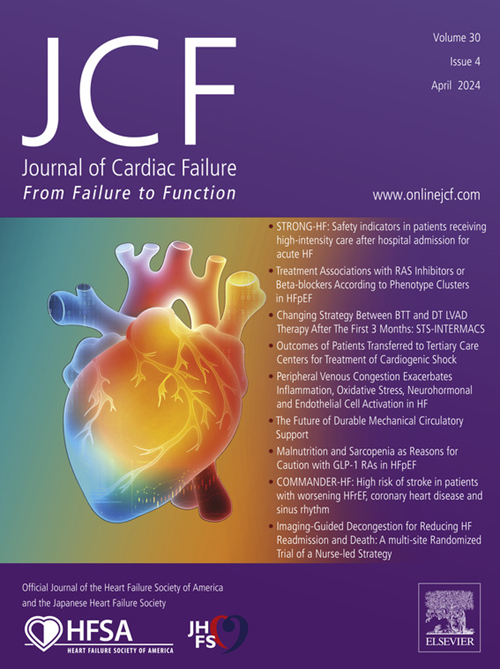Exploring The Relationship Between Caregiver Contributions To Heart Failure Self-care And Patient Self-care
IF 6.7
2区 医学
Q1 CARDIAC & CARDIOVASCULAR SYSTEMS
引用次数: 0
Abstract
Introduction
Heart failure (HF) poses a global health challenge, contributing to frequent readmissions and emergency department visits. Effective HF management requires active patient engagement in self-care, yet many patients struggle with its execution. This underscores the crucial role of caregivers in supporting patients' self-care activities. Despite the recognized importance of HF self-care and caregiver involvement, uncertainties persist regarding the impact of increased caregiver contributions to self-care on patient outcomes, emphasizing the need for further research.
Hypothesis
This study aims to investigate the relationship between caregivers' contributions to HF self-care and patients' self-care maintenance, monitoring, and management.
Methods
A secondary analysis was conducted on data from a cross-sectional study involving 277 HF dyads (277 adult HF patients18 years and older and 277 primary caregivers). Patients were classified according to the New York Heart Association (NYHA) functional classes I-IV. Convenience sampling was employed at outpatient centers between March 2017 and January 2019. Data were collected using the Self-Care of Heart Failure Index (SCHFI v.7.2) and Caregiver Contribution to Self-Care of Heart Failure Index version 2 (CC-SCHFI v.2). For data analysis, multiple regression was utilized.
Results
The average patient age was 68 years (range: 39-97 years), with a slight majority being male (54.9%). Conversely, caregivers were predominantly female (70.4%) with an average age of 52 years. The degree of kinship highlighted that a significant proportion of caregivers were children (46.9%), followed by spouses (28.2%). majority of HF patients had a NYHA class II (38.3%), indicating a mild level of heart failure symptoms among participants. Notably, a combined 39% of participants fell into NYHA classes 3 and 4, indicating moderate to severe heart failure symptoms and limitations in daily activities. There was a statistically significant positive association between caregiver contribution to HF self-care maintenance with patient self-care maintenance (β = 0. 245, p <.001, 95% CI [0.143, 0.348]). Caregiver contribution to HF self-care monitoring showed significant association with patient self-care monitoring (β = 0.253, p <.001, 95% CI [0.133, 0.374]). In the realm of patient self-care management, caregiver contribution to self-care management was associated with patient self-care management (β = 0.467, p < 0.001, 95% CI [0.352, 0.583]).
Conclusion
This study revealed a statistically significant positive association between caregiver contribution and all aspects of self-care (maintenance, monitoring, and management) in heart failure patients. Given the substantial proportion of patients with advanced stages (NYHA III & IV), further research is necessary to optimize how caregivers can best support patients in self-care practices.
求助全文
约1分钟内获得全文
求助全文
来源期刊

Journal of Cardiac Failure
医学-心血管系统
CiteScore
7.80
自引率
8.30%
发文量
653
审稿时长
21 days
期刊介绍:
Journal of Cardiac Failure publishes original, peer-reviewed communications of scientific excellence and review articles on clinical research, basic human studies, animal studies, and bench research with potential clinical applications to heart failure - pathogenesis, etiology, epidemiology, pathophysiological mechanisms, assessment, prevention, and treatment.
 求助内容:
求助内容: 应助结果提醒方式:
应助结果提醒方式:


